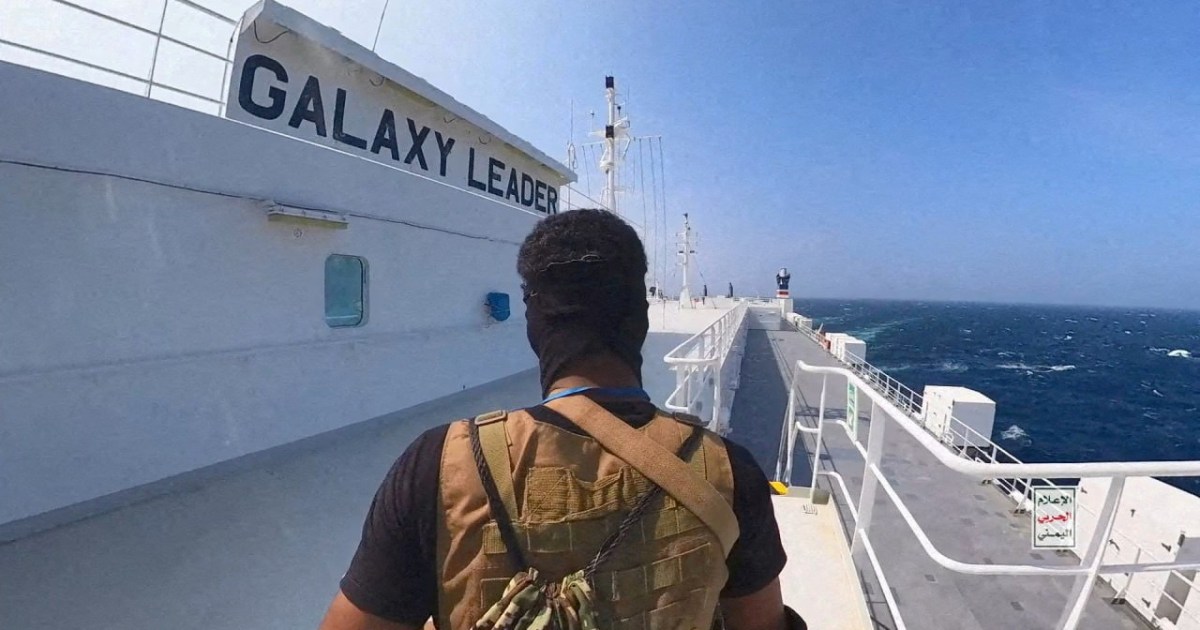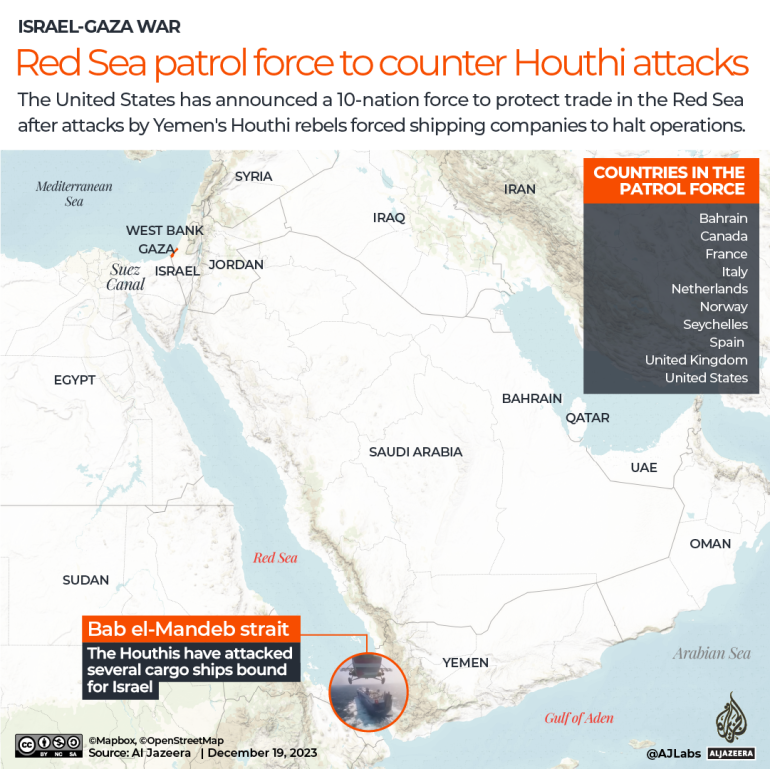
The US military said it sank three Houthi ships in a statement on Sunday, killing 10 fighters from the Yemeni armed group after a clash in the middle of one of the world’s most important commercial waterways.
The escalation follows weeks of Houthi attacks on ships traveling through the sea, allegedly in an attempt to pressure Israel to end its devastating war on Gaza, which has killed more than 21,000 Palestinians in the besieged Strip.
US destroyers have joined with several other nations to stop Houthi attacks in the Red Sea as part of Operation Prosperity Guardian – although several of their partners have distanced themselves from the initiative.
Monday’s Red Sea clash was the first major direct military engagement between the US military and Houthi fighters. Here’s what we know about how it all unfolded:
What happened on Sunday?
At 6:30 a.m. Yemeni time (03:30 GMT) on Sunday, the Danish-owned, Singapore-flagged container ship Maersk Hangzhou The US Central Command (CENTCOM) issued a second distress call in a day on X, reporting an attack by four “small Houthi boats”. CENTCOM added that the Houthis attempted to board the Maersk ship, which was traveling through the southern Red Sea.
In response to this distress call, helicopters from two warships, the USS Eisenhower and the USS Gravely, flew towards the Maersk ship. CENTCOM said the crew of the destroyer USS Gravely initially shot down two anti-ship missiles fired at the Maersk ship.
Why did the US sink Houthi boats?
Four small boats then attacked the same cargo ship with small arms fire and Houthi fighters attempted to board the ship, the U.S. Navy said. The U.S. Navy said it then warned the hunters to stay away from the ship, and the helicopters came under fire.
The helicopters fired back, sinking three of the boats. Houthi crew members in the boats were killed. The fourth boat escaped the area and no U.S. personnel or equipment were harmed, CENTCOM added.
“We will act in self-defense moving forward,” a White House official said.
A spokesman for the Houthis confirmed that ten of their fighters were “dead and missing” after the attack on their boats.
Iran-backed Houthi small boats attack merchant ships and US Navy helicopters in the southern Red Sea
At 6:30 a.m. (Sanaa time) on December 31, the container ship MAERSK HANGZHOU issued a second distress call in less than 24 hours, reporting that it was under attack by four Iranian-backed ships. pic.twitter.com/pj8NAzjbVF
– US Central Command (@CENTCOM) December 31, 2023
How did Maersk and other shipping companies react?
Maersk announced on Sunday that it would suspend all sailings through the Red Sea for the next 48 hours. On December 27th, it had planned several dozen container ships to sail through the Suez Canal and the Red Sea in the coming days and weeks.
Together with the German shipping company Hapag-Lloyd, Maersk operates almost a quarter of the global shipping fleet.
Other shipping companies have also reacted to the escalating maritime conflict. Companies including CH Robinson, Evergreen, HMM, Ocean Network Express, Wallenius Wilhelmsen and Yang Ming Marine Transport plan to avoid the Red Sea and increase the number of ships rerouting around Africa’s Cape of Good Hope instead of the Suez Canal. This new route is longer and more expensive. Evergreen has also temporarily stopped accepting Israeli cargo.
Although these attacks had a “fairly limited” impact on the Oil market So far, experts believe that prices could rise if the situation persists.
Why are the Houthis attacking ships in the Red Sea?
The one supported by Iran Houthis started Launch drones and rockets on the southern parts of Israel in October, shortly after the outbreak of war on October 7th.
However, the drones were intercepted or missed their targets. In a change of tactics, the group began attacking ships in the Red Sea that it claimed were linked to Israel. Your attacks have disturbed many ships on the way to Israel.
On December 19, US Secretary of Defense Lloyd Austin announced the creation of a multinational maritime protection force to counter the Houthis. Nevertheless, the Houthis have said they will do it do not give in unless Israel ends its war against Gaza.

Despite a multinational coalition Although the U.S. has agreed to support the U.S. cause, only the U.K. has directly provided warships, leaving Washington effectively “alone” against the Houthis, Al Jazeera’s Resul Serdar reports from Djibouti, on the edge of the Red Sea .
Serdar added that the US has so far “failed to deter the Houthis” with the group. carry out attacks even more often. He added that the latest clash represented a serious escalation as the US not only sank Houthi boats but also killed Houthi fighters. Such confrontations make you fearful regional Escalation of war that could draw Yemen into the conflict.






Recent Comments